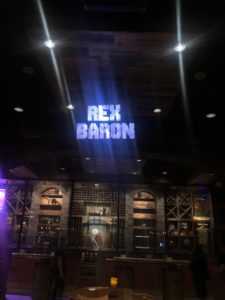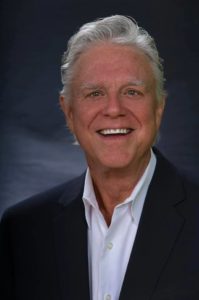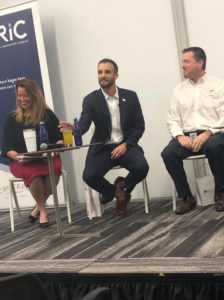
“I believe we will soon see leaders using the language of reconciliation, of healing and unifying. Perhaps the noise of the present has been drowning out the voice of reason—the voice of the future that is still there.” —Frances Hesselbein, chair of the Hesselbein Leadership Forum at the University of Pittsburgh and former CEO of the Girl Scouts of the USA.
I admire Frances Hesselbein.
I read her leadership themed email every day.
She is optimistic.
Leadership by definition is optimistic.
We have been missing the voice of the future for a long time in our community and that absence has created a tremendous amount of damage. When you stop focusing on the future it passes you by. You tend to get bogged down in the mundane daily battles that blur with time and don’t add up to anything productive.
It’s the day after the Delray Beach municipal election—another bruiser that did little to elevate the conversation around town and a lot to take us further down the “hey, let’s continue to hate each other” rabbit hole that simply does not work.
So let’s congratulate Vice Mayor Shirley Johnson and newcomer Juli Casale on their victories and hope that in the midst of a huge national crisis, we are able to come together in Delray.
But before we move on and the election fades from our memories, we should do a brief post-mortem.
So what did we “learn” over the past two plus months of intense campaigning?
Here’s a brief primer in case you might have gone numb.
Election Narrative: All developers and all development is Bad—It doesn’t matter what the project is, it’s all no good. Developers are rapacious, corrupting criminals and somehow we’d be so much better off without them.
Reality: Without investment we’re dead.
Healthy cities need to grow their tax base. Healthy cities need to create jobs and they need to offer housing especially attainable housing so that families and young people have a way of becoming part of our community. We need good development, smart growth, attractive design and policies that promote economic and environmental sustainability. We didn’t get that discussion in this election cycle or in past cycles either to be fair. And until we have that conversation as a community, we are doomed to keep slinging a lot of lies and innuendo at each other. How sad for us. How unproductive. We need to do better and we can do better.
Election Narrative: Business interests— but especially developers —are a “special interest” and therefore not worthy of participating in our local elections.
They shouldn’t make a donation to a candidate who they think might be good for Delray; they can however continue to pay taxes and shut their mouths when it comes to endless approval processes and endless insults relating to the damage they are allegedly doing.
So it doesn’t matter that maybe you hope to exercise your property rights or whether you are following the city’s codes or acting on a vision…. say to jump start the Congress Avenue corridor or create a job or provide a home for a young family. The message is clear: how dare you. I’ve met a slew of developers over the years. Some were terrible. I mean lock the doors, check your wallets and take a shower after meeting them bad. And some were terrific.
Reality: In my experience, the good ones don’t want to buy anyone and would never do so. That’s one of the reasons they’re good. They believe in their projects and their vision and are willing to take risks to make things happen.
They don’t mind tough standards as long as the playing field is level and the process is not endless. Candidates often decry “developer money” flowing to their opponents, but why would developers support candidates who base their campaigns on stopping development? Not bad development, all development.
Election Narrative: Endorsements are worthless and reflect poorly on the candidate who receives them.
So if the police and fire union endorses you, it’s only because they want bigger pensions and higher salaries. It can’t be because you have been supportive of police and fire or they think you’d best serve the people of the community they are sworn to serve and protect.
Reality: Never mind the fact that in the last contract negotiation they agreed to give up benefits. Never let the facts get in the way of a good mail piece.
Let’s pretend that it makes sense to portray our police officers and firefighters as mercenaries. Hey I get it, unions and all. But, I’ve known two-plus generations of officers and firefighters; they care about Delray and will do what’s right for the city when it comes to crunch time. If you think the best way to “deal” with them is confrontation you are wrong.
Election Narrative: Challenger vs. Corrupt Establishment
We can’t discuss issues in any kind of depth because we get caught in the endless spiral of attacks and counter-attacks.
So here’s how it goes: Challenger (usually inexperienced with little in the way of a civic resume takes on “establishment” candidate (which is code word for someone who has spent at least a few years working in the community or serving in office).
Challenger attacks record, character and integrity of their opponent. Opponent feels compelled to strike back and call the challenger inexperienced, a bully and a liar. And so it goes down into the gutter.
To be fair, in this particular cycle, several of the challenger candidates ran very positive campaigns—a few didn’t. All are to be commended for running because it’s a huge commitment. I hope commissioners seek to put several of the candidates on boards where they can get experience and learn more about the city they seek to lead.
There’s a lot more to discuss. Campaign finance reform, an apparent disconnect between the stated level of spending and the amount of mail we receive, the divisions in our city. Especially the divisions and the need to move past issues once they are decided.
The re-elected, the newly elected, the incumbents and we the people have an opportunity here to heal those divisions or at least agree to disagree in a more civil manner.
Our first order of business is to make it through the virus—which is sure to change our world and our local community in ways we can’t even begin to fathom yet.
But this too shall pass—and we have a responsibility to each other to find a way forward together.
The election was close—and it was a split decision. Which means there is an opportunity for all “sides” and viewpoints to reach out and be inclusive.








